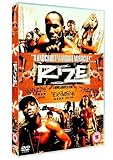Eye For Film >> Movies >> Rize (2005) Film Review
"When something happens in South Central Los Angeles, nothing happens. It's just another ni**er dead."
So went the introduction to Straight Outta Compton, a 1988 hit from rap trio NWA, pre-empting a splurge of hip-hop records similarly lacquered in brutality. Until recently this vision of violence aptly summarised boroughs like Inglewood, Compton and Watts. The song followed the infamous Watts Riots of 1965 and narrowly preceded 1992's Rodney King riots. L.A's "ghetto" areas have been associated with drugs and gangland warfare ever since.

From these mean streets, debut director David LaChappelle has extracted a story of extraordinary poignancy and importance. His documentary charts the rise of "clowning", an alternative style of dance, created by a reformed drug dealer just released from prison. Ever since Tommy Johnson dressed up as Tommy the Clown and started shaking his ass and mimicking the tribal celebration of his ancestors to the sound of hip hop music, thousands of kids from this underprivileged area have followed suit.
Clowning was originally done by Tommy and a group of young, face-painted helpers at various birthday parties in South Central. Quickly other youths joined; there are now over 50 different clowning groups in South LA. It even has its very own rugby league-style alternative: Krumping, a more violent, performance-based version of Clowning. Proponents of the two styles compete annually at the Battle Zone.
The importance of all this pizzazz is that it keeps youths out from trouble. Instead, faces decorated in warrior paint, the participants enact mock battle situations in their movements, exercising their frustrations in a better way. Tommy looks to stamp down hard on anyone caught straying; he is desperately keen to lead these kids away from gangs, guns and drugs.
Like many documentaries, Rize lacks structure and narrative. We are introduced to Clowning, then to Krumping and then we see the Battle Zone, after which the film treads water, clumsily overcooking its message of salvation. There are missing links: LaChappelle might have explained how Krumping came to develop from Clowning, or considered the future of the dance form. There is need for a little more narrative help here.
Such problems fade to insignificance in the face of Rize's most powerful moments. These come from interviews with the honest, charming dancers, who are painfully aware of the viciousness around them. Dragon tells of raising four siblings alone while his mother took drug rehabilitation. Tight Eyez solemnly vows to protect Baby Tight Eyez from the lure of the gangs. Miss Prissy glumly remembers her alienation upon visiting Hollywood; all of the protagonists relive tragic family scenes, or violent moments. When they smile, you smile, relieved that they are happier now.
The key to Rize's success is LaChappelle's subtle direction. Happily letting the children and Tommy do the talking, he mixes in glorious dance sequences, like feature songs in a musical, just when you want them. He even films the Clowns in a music video colour setting to stress the quality and appeal of their art.
Most importantly, his film resonates with optimism. The spectacle of these dancing children is one of the most joyous sights to occupy a cinema screen in recent years.
Reviewed on: 03 Dec 2005



















